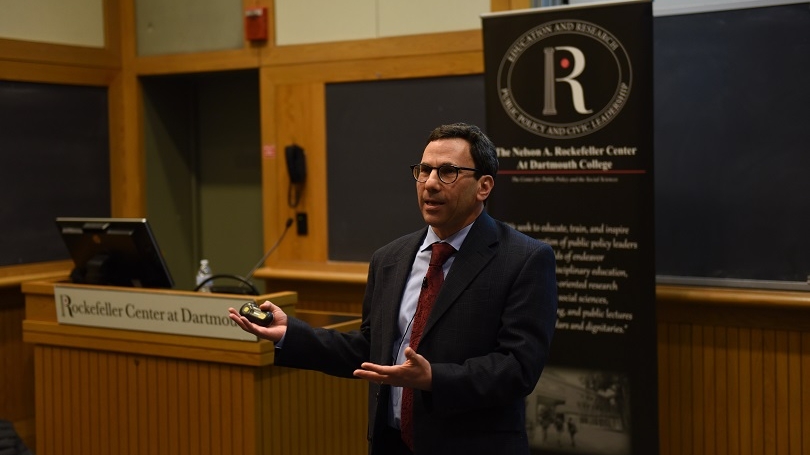
- Public Policy
- Leadership
- Funding
- News & Events
- About the Center
Back to Top Nav
Back to Top Nav
Back to Top Nav
Back to Top Nav
Eric Patashnik, the Julis-Rabinowitz Professor of Public Policy and Political Science at Brown University, gave a riveting lecture on “Unhealthy Politics: The Battle over Evidence-Based Medicine,” on Thursday, April 19 at the Rockefeller Center for Public Policy.
Professor Patashnik is the first to admit that the medical field is not usually within the purview of most political scientists. However, an article published in the New England Journal of Medicine caught his eye. The study found that a common knee surgery used to treat osteoarthritis was no better at relieving joint pain than not performing the surgery at all. The study concluded that 80-90% of patients who had been recommended for this surgery didn’t actually need it. Professor Patashnik expected the medical community to have a rigorous debate about the merits of this surgery before ultimately deciding to phase it out of normal use. This was not the case. He watched as the medical community “used their efforts to maintain maximum coverage of this operation under Medicare” instead of debating the merits of the surgery itself. Patashnik realized that the reaction of the medical community exposed the “deeper problem of medical evidence” and its basis for current health practices.
Professor Patashnik’s research found that under half of treatments have evidence to back their use and that while there are federal agencies that supervise medication, there is no agency that controls trials for surgical procedures. Frustrated with this reality, Patashnik set out to explain why this issue persists and found that there were three key stakeholders; the public, physicians, and public servants. The problem Patashnik exposed was that while “doctors have tremendous influence on public opinion,” they don’t utilize their influence for reform. Similarly, public servants did not want to challenge the strong reputation of physicians in the policy arena due to concerns over re-election.
Asked if he thought it more valuable to work for change amongst physicians or the populous itself, Patashnik believes that physician leadership is key.
“The average patient doesn’t know what treatment they need when they go to the doctor,” says Patashnik. Educating the public is valuable and there have been efforts to try to raise awareness of problems of overtreatment and undertreatment. However, at the end of the day, in his opinion, physician leadership, professional responsibility, changing the norms of the medical profession is going to be essential, because they are to whom the ordinary public looks to for guidance and leadership.
Patashnik ended his talk explaining that “this is not about less medicine, it’s about better medicine.” He believes that there needs to be a shift within the medical community toward the valuation of evidence as a basis for procedures. Patashnik argues that this reform will have to start by training doctors to evaluate evidence during medical school. “This shouldn’t be a partisan issue,” Patashnik concluded, “it effects all Americans.”
Written by Lauren Bishop ’19, Rockefeller Center Student Program Assistant for Public Programs
The views and opinions expressed, and any materials presented during a public program are the speaker’s own and do not necessarily represent the views and opinions of the Rockefeller Center or constitute an endorsement by the Center.